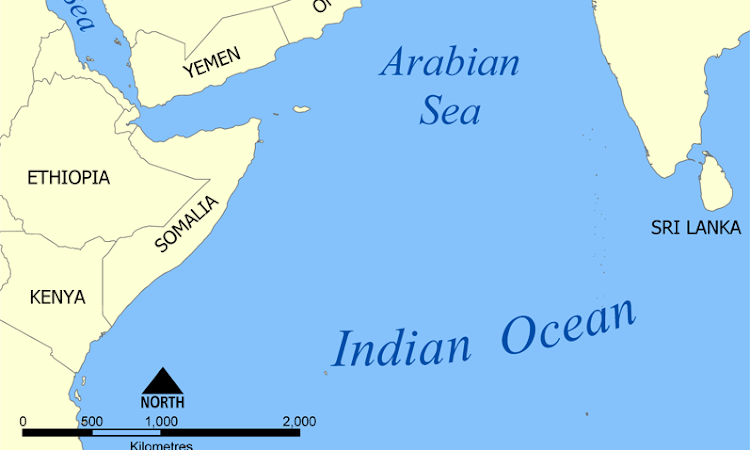Nestled along the southwestern coast of the Indian subcontinent, the Arabian Sea orchestrates a harmonious symphony of trade, fisheries, and marine wealth, profoundly shaping India’s economic landscape and ecological well-being. Stretching from India to the Arabian Peninsula and the Horn of Africa, this expansive body of water, akin to a maestro’s baton, conducts a dynamic interplay between human aspirations and nature’s bounty.
Economic Nexus: A Gateway to Global Commerce
For centuries, the Arabian Sea has served as India’s gateway to the world, a vital conduit for trade and commerce. Its strategic location, akin to a crossroads of civilizations, has transformed it into a bustling hub of maritime activity. Ports like Mumbai, Kochi, and Kandla, acting as key gateways for imports and exports, have played a pivotal role in India’s economic growth and global integration.
The Arabian Sea’s trade routes, like arteries carrying lifeblood, have facilitated the exchange of goods, ideas, and cultures across continents. From spices and silks to automobiles and electronics, the sea has witnessed the passage of countless vessels, connecting India to distant markets and fostering economic prosperity.
Fisheries: A Lifeline for Coastal Communities
Beyond its role in global trade, the Arabian Sea’s bounty sustains a thriving fishing industry, providing a lifeline for millions of coastal communities. Its rich fisheries, akin to a vast underwater cornucopia, teem with diverse marine species, serving as a source of sustenance and livelihoods.
Fishing communities along India’s coastline, like seasoned fishermen casting their nets, have relied on these fisheries for generations. The sea’s bounty, from tuna and sardines to mackerel and prawns, has provided sustenance, employment, and cultural identity for countless families.
The Arabian Sea’s fisheries, a cornerstone of India’s food security, contribute significantly to the nation’s nutritional needs. The sea’s harvest, like a bountiful banquet, provides protein-rich seafood for domestic consumption and export, ensuring food security for millions.
Marine Wealth: A Treasure Trove Beneath the Waves
Beneath its glistening surface, the Arabian Sea harbors a treasure trove of marine wealth, a testament to nature’s artistry. Its nutrient-rich waters, like a fertile garden, nurture a vibrant marine ecosystem, teeming with diverse marine life.
Coral reefs, mangrove forests, and seagrass meadows, akin to underwater cities, provide essential habitats for a myriad of species, including fish, crustaceans, mollusks, and marine mammals. These ecosystems, like intricate tapestries, play a crucial role in maintaining the balance of the marine environment.
The Arabian Sea’s marine wealth, like a hidden treasure chest, holds immense economic and ecological value. The fishing industry, fueled by the sea’s bounty, contributes significantly to India’s economy, generating employment, revenue, and foreign exchange.
Navigating the Path to Sustainability: A Delicate Balance
As India charts its course towards economic growth and development, it must also navigate the delicate balance between harnessing the Arabian Sea’s resources and safeguarding its ecological integrity. Overfishing, pollution, habitat degradation, and climate change pose significant threats to the sea’s health and biodiversity.
Sustainable fishing practices, akin to mindful harvesting, are essential to ensure the long-term sustainability of the fisheries. Fishing regulations, gear restrictions, and closed seasons can help prevent overexploitation and allow fish populations to replenish.
Pollution control measures, like filters and treatment plants, are crucial to protect the sea from harmful contaminants. Industrial waste, agricultural runoff, and plastic debris can have detrimental effects on marine life and ecosystems.
Habitat protection, like safeguarding a precious sanctuary, is essential to preserve the sea’s biodiversity. Marine protected areas, mangrove conservation efforts, and coral reef restoration initiatives can help maintain the integrity of these vital ecosystems.
Striking a Harmony for the Future: A Testament to Sustainable Stewardship
The Arabian Sea’s multifaceted significance demands a holistic approach to its management. Striking a harmonious balance between economic progress and ecological conservation is crucial to ensure the sea’s sustainable use and preservation for generations to come.
India, recognizing the sea’s importance, has taken concrete steps towards sustainable stewardship. Implementing regulations to curb overfishing, promoting sustainable fishing practices, and establishing marine protected areas are examples of India’s commitment to environmental protection.
International cooperation, like a collective orchestra, plays a crucial role in addressing shared challenges such as marine pollution and climate change. India’s active engagement in international efforts, such as the UN Convention on the Law of the Sea and the Regional Cooperation Agreement for Combating Piracy and Armed Robbery at Sea, demonstrates its commitment to global environmental governance.
By striking a balance between economic growth and environmental stewardship, India can harness the Arabian Sea’s treasures responsibly and safeguard its ecological integrity for the future. This delicate harmony, akin to a symphony’s crescendo, will ensure that the Arabian Sea continues to enrich India’s


